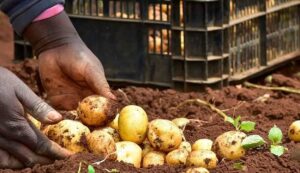‘True Potato Seed’ is helping farmers in potato cultivation in Tripura
Agartala: True Potato Seed is a cutting-edge strategy being used in Tripura to overcome the main issues with conventional potato farming, opening the door for more effective and sustainable farming methods.

In an interview with the media representativet, Dr. Rajib Ghosh, Deputy Director of the Horticulture Research Center in Nagicherra, Agartala, discussed True Potato Seed (TPS) and its revolutionary effects on potato growing.
He underlined how TPS is revolutionizing agriculture by addressing significant issues in conventional potato production.
Tubers are used as seeds in traditional potato farming; one hectare of land requires around two metric tons of seed potatoes. Such big volumes become costly and logistically challenging to carry, particularly in mountainous places.
However, the TPS approach removes these difficulties. Farmers may produce the same area with only 100 grams of seeds, which lowers expenses and transportation work. The seeds are a great option for farmers in isolated areas since they are small, rot-resistant, and manageable.
The benefits of TPS and botanical seeds, according to the authorities, include increased yields since crops cultivated using TPS produce more than those produced using conventional techniques. Additionally, this culture is pest-resistant, allowing crops grown from botanical seeds to exhibit increased pest resistance.
TPS-grown potatoes and hybrid vegetables are among the items that exhibit increased production and quality.
According to Dr. Ghosh, TPS is being developed in Tripura as part of many government programs. Specialized crossing and multiplication blocks guarantee the production of high-quality seeds throughout the winter. Tripura produces TPS, which is exported to Bangladesh and Kenya and is in great demand both locally and abroad.
“Traditional farming in agriculture, particularly in the production of potatoes, depends on tubers, or potatoes, to produce new potato plants. Farmers must use a truck to carry the roughly 2 metric tons of seed potatoes needed to develop one hectare of land using this approach. Due to limited accessibility and high transit expenses, transportation becomes a major concern in mountainous areas,” he stated.
True Potato Seed (TPS), on the other hand, provides a ground-breaking remedy. To grow one hectare of land, only 100 grams of TPS are needed. Farmers can simply carry the seeds in their pockets because of their small size, which removes logistical challenges and transportation expenses.
Furthermore, TPS doesn’t decay, so handling it over long distances is safe and dependable. TPS and botanical seeds provide a number of benefits. Greater Yield: TPS-grown crops yield more than those produced using conventional techniques. Resistance to Pests Pest resistance is higher in plants cultivated from botanical seeds. Advantages of Hybrid TPS-grown potato crops are more productive and of higher quality, much as other hybrid crops (such hybrid vegetables), he said.
The importance of artificial illumination in the hybridization process was further discussed by another expert, Sudhriti Das, Assistant Director at the Horticulture Research Center in Nagicherra, Agartala.
“In winter, limited daylight hinders flowering, which is crucial for higher yields,” he said.
This is addressed by extending daylight hours with the use of sodium vapour lamps, which encourage efficient blooming. Insufficient blooming would result in a poorer yield without these lights.
Many specialists also believe that Tripura’s climate is conducive to hybridization.
“Lights are shining all around us, as you can see. These lights are crucial to the hybridization process that we are presently experiencing. Because of the unique properties of light, this process becomes very important during the winter months. Extended sunshine is necessary for flowering; however, wintertime daylight hours are very restricted, with darkness falling as early as 4 PM. We lengthen the photoperiod by using sodium vapour lamps to make up for this. Higher yield results from the blossoming that these lights encourage.
Even though the plants may thrive without these lights, their ability to blossom would be severely limited, according to Dr. Das.
About 60 to 70 kg of seeds are used each year for hybridization in Tripura, where there is a particularly strong demand for these lights. These methods are also used in other states, including Odisha, Maharashtra, Uttar Pradesh, Bihar, and Assam. However, because of less favorable climates than Tripura, these states are unable to grow the seeds domestically. Tripura’s perfect climate is comparable to that of an area of South America that is where this technique of producing seeds was first developed,” he said.
International attention has also been drawn to Tripura’s success with the strategy. During a recent visit to the area, a South Korean scientist who was the original TPS pioneer from Lima, South America, commended its creative approaches. Even when contrasted to efforts in their own nations, they recognized Tripura’s accomplishments as unparalleled.
Dr. Das further underlined that favorable circumstances and the lack of natural catastrophes during crucial times are to blame for Tripura’s success with hybridization. Because of its continuous success, Tripura’s model has been studied and replicated by scientists from all around India and the globe.
By guaranteeing sustainable farming methods and promoting global agricultural innovations, the project seeks to establish Tripura as a center for the production of True Potato Seed.





